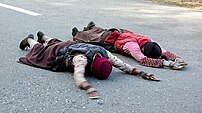In the final chapter of Running – the Sacred Art we come full circle to the concepts laid down at the onset of this book. I really like this George Sheehan quote Warren Kay uses to open the chapter:
Don’t be concerned if running or exercise will add years to your life, be concerned with adding life to your years.
We need to find a balance and find a way to enjoy life. As runners running will be a large part of that enjoyment. I think running for all of us is fun and at some level we all want to improve and push ourselves to our physical limits. Most of us need help doing that. I thought I could train for a marathon by myself but at the last minute realized I’d be much better off taking the marathon training class offered by my running club. That was the right choice. Not only did I receive coaching, but I also met new people and had others to push me when I was tired and encourage me along the way.
Kay says that it is important for all runners to have a “coach”, but especially spiritual runners. I put coach in quotes because your coach might be your running group. I don’t think you need a specific person to coach you but having someone or a group of people to push and challenge you is vital. I think he used the coach term because it translates better for most of us to the spiritual. We need someone or a group of people to challenge and push us spiritualy as well as in our running. This could be a pastor, imam, priest, or other spiritual leader.
In both the running and spiritual realms Kay thinks coaches provide three valuable things:
- Proper guidance
- Adequate support
- The right attitude
Just like it takes pain to become a better runner, it can take some pain and brokenness to become a more spiritual person. Kay compares it to running up a hill, most people don’t like to do it – requiring an attitude change, you have to adjust your stride – or adjust your life to find balance, and it can be slow going – it takes patience and fortitude.
I think he ties the whole point of his book together with this final quote:
Having made contact with that pat of myself, the spiritual quest – which is the endeavor to find who I am and be truly at home with myself, to establish a healthy relationship with others, and to have a healthy relationship with God – is a natural outcome.
We runners are special and have a unique opportunity to find our way to God through our running.
The last section of the book is a list of suggested readings. I have created an Amazon collection of the books I could find in their selection.
[tags] Warren Kay, Sacred Art, Balance, Spiritual [/tags]
![Reblog this post [with Zemanta]](https://i0.wp.com/img.zemanta.com/reblog_e.png?w=625)

